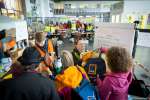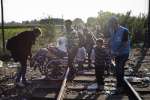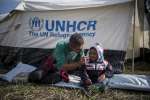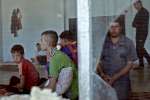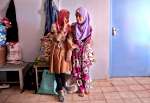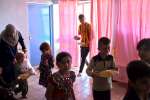- Text size
 |
|  |
|  |
| 
- Français
UNHCR's annual consultations with NGOs look to new challenges
News Stories, 28 June 2011
GENEVA, June 28 (UNHCR) – The UN refugee agency's annual consultations with its non-governmental partners opened in Geneva on Tuesday with a look ahead at the growing challenges faced by relief agencies amid persisting and multiplying crises.
"Since the beginning of the year, we have witnessed a multiplication of crises, many of them totally unpredicted, with a significant impact on the displacement of people. But [at the same time] old crises seem to never die," said UNHCR chief António Guterres, referring to the recent conflict in Côte d'Ivoire, current uprisings in North Africa and the Middle East as well as the instability in Afghanistan, Iraq, Somalia and Sudan.
The three-day meeting involves participants from 211 non-governmental organizations representing 72 countries. Delegates will discuss issues related to the assistance and protection of forcibly displaced people.
"New emphasis needs to be put on urban refugees, land and property rights, IDPs (internally displaced people), statelessness issues that were not part of the agenda not so long ago," said Julien Schopp, Senior Policy Officer for the International Council of Voluntary Agencies, which helped organize the meeting. "It is necessary to take stock and look at ways we can strengthen the protection regime."
Asylum-seekers are experiencing more limited access to countries where they can be protected while treatment of their asylum claims is becoming less fair. Guterres said this is mainly due to negative public opinions in some developed countries towards asylum-seekers, migrants and foreigners in general. He warned that a similar trend is also emerging in the developing world following recent policy changes in areas such as southern Africa.
Access is unpredictable, and this increases the level of risk for humanitarian actors. The High Commissioner noted, "The restrictions governments put on humanitarian access, based on political considerations and the assertions of national sovereignty that sometimes come at the expense of meeting humanitarian needs, is another area where there was no improvement compared to last year."
He added, "With the trend of shrinking asylum space combined with shrinking humanitarian space, I feel things will get worse before they eventually, hopefully, start to get better."
When the 1951 Refugee Convention came into being 60 years ago, there were some 2.1 million refugees. Today, there are nearly 44 million uprooted people around the world. Some 7.2 million of them are refugees who have been in exile for prolonged periods, including in some cases for decades. NGOs have been instrumental in assisting them, including in some of the most remote places. UNHCR is currently working with a network of 700 NGOs worldwide.
By Fatoumata Lejeune-Kaba in Geneva















